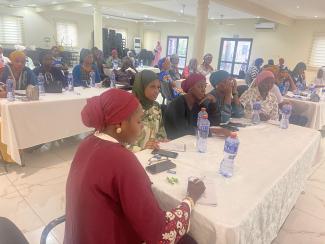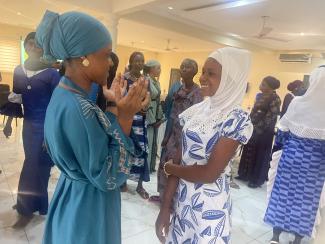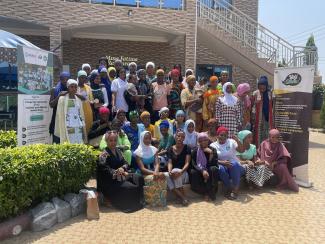Empowering Fulbe Girls:
Transforming Lives Through the Girls Caucus Training
"I found my voice, and now I'm helping other girls find theirs." These powerful words from Amina, a young Fulbe girl in Ghana, capture the essence of a transformative initiative that is changing lives in the Northern region.
In Ghana, the Fulbe people have long faced exclusion and stigma. This marginalization affects Fulbe youth, and impacts Fulbe girls particularly hard, as they often struggle with limited education, early marriage, and a lack of opportunities to speak up for themselves.
However, change is unfolding through the Girls Caucus training program, an initiative led by Youth Empowerment for Life (YEFL)-Ghana, a local NGO based in Tamale, with funding from USAID/OTI’s Littorals Regional Initiative (LRI) program. It began with a Fulbe youth leadership bootcamp in March 2023 where LRI and YEFL-Ghana quickly observed that only 30% of participants were girls. These few girls faced challenges expressing themselves and engaging with their male peers, highlighting the deep-rooted cultural barriers that hinder female interaction in mixed social settings.

Recognizing this critical gap, LRI and YEFL-Ghana initiated the Girls Caucus training—a targeted intervention designed to address the unique challenges faced by Fulbe girls. The program created safe spaces where girls could openly discuss issues ranging from lack of access to education to early marriages and gender stereotypes.
The program launched in February 2024 with training for wheresix Fulbe girls to become trainers. These newly-trained leaders were supported by YEFL to train an additional 34 girls from across the five regions of Northern Ghana. The training covered important topics like personal development, public speaking, advocacy, and leadership skills – tailored specifically to meet the needs and cultural context of Fulbe girls.
"Before the training, I was hesitant to express my opinions," Amina admits. "The conservative culture in our community often silences girls. Now, I feel empowered to speak up and make a difference."
Fatima, another participant, added, “I've learned how to identify stakeholders and advocate for our community's needs. It's already making a difference in how we address issues like access to education, which has been a longstanding problem for Fulbe girls."
The impact was immediate and far-reaching. What started as a group of 40 girls has now grown to include 80 participants across five regions. They stay connected through WhatsApp, holding weekly meetings to interact, exchange ideas, offer mutual support, provide updates on new initiatives, and seek advice from peers.
These empowered girls are now taking action in their communities.
They have conducted community outreach programs on crucial topics such as health and education, breaking down barriers that have long kept Fulbe girls from accessing these basic rights. Abiba Jallo, a caucus member, shared her experience: "We engaged some young Fulbe girls and spoke about personal hygiene. They were so eager for information that they've been asking us to come back and discuss more issues. It's clear that there's a huge hunger for knowledge and empowerment."
One of the most significant outcomes has been the Caucus members' efforts to combat forced and early marriages – a persistent issue in the community. Individual members have taken it upon themselves to educate young Fulbe girls about the consequences of these practices. In some instances, they have even intervened to rescue girls from forced marriages. Abiba recounts, "After the Girls Caucus training, I have been posting some educational issues regarding the training I had on my WhatsApp status and a girl from my village reached out to get advice on what to do and how to approach the issue of getting married out to an elderly man." Another member, Mohammed Nafisa, shared a similar experience: "We were on our community sensitization trip and a parent (mother) engaged us to help rescue her daughter who was about to be given out to an elderly man for marriage... Currently, the girl is in Tamale learning a trade."

The initiative has also opened doors to partnerships with organizations like Catholic Relief Services (CRS), West Africa Network for Peacebuilding (WANEP), and Amplio Ghana, creating employment opportunities for Fulbe youth. Through YEFL’s support and recommendations, some of the girls are now working as enumerators for a CRS project which focus on Prevention of Violent Extremism Through Social Accountability (PoVETSA), while others are engaged as community representatives in a WANEP project – roles that were previously out of reach for many Fulbe youth, especially girls.
The Girls Caucus is even changing how Fulbe communities view leadership. The girls held online elections to choose their leaders. They're meeting with community elders and gaining support for their work – a significant achievement in a traditionally patriarchal society. One Fulbe youth leader summed it up:
"We're not just changing individual lives; we're transforming the future of the entire Fulbe community."
This success story shows the power of targeted, culturally aware programs. By investing in Fulbe girls, USAID and YEFL-Ghana are tackling deep-rooted problems. They're building a brighter, more inclusive future for an entire community.
Amina, Fatima, and their peers are living proof. Given the right tools and support, Fulbe girls can become powerful voices for change. Their success inspires us all and shows what's possible when we invest in young women's potential.


